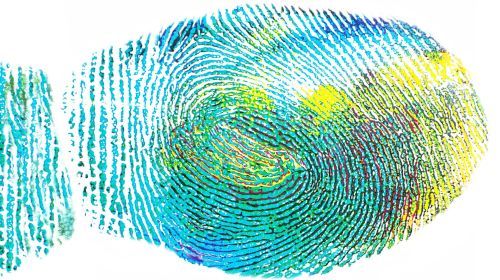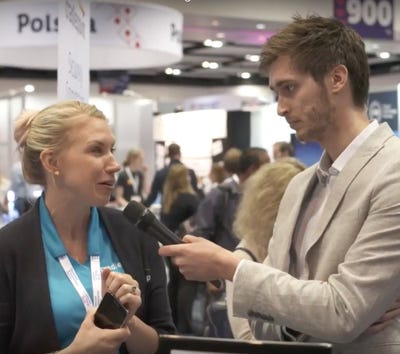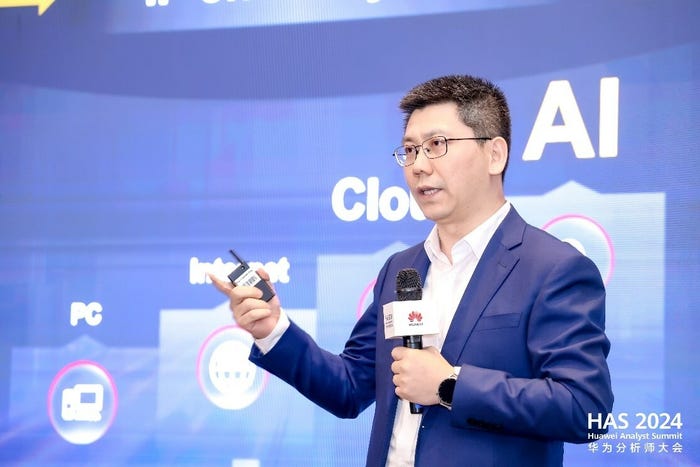Blockchain of Things CEO and founder Andre De Castro, father of the idea to apply blockchain technologies to the IIoT, explains the virtues of blockchain beyond cryptocurrencies and explains how its shortfalls can be overcome.
May 31, 2017

As a long-time cryptocurrency specialist, Blockchain of Things CEO and founder Andre De Castro has had oversight of blockchain's development since its absolute infancy and has been an active participant in the Bitcoin community since 2010.
He's approached both from almost every perspective imaginable, as a developer, investor, trader, advisor and even US government policy influencer. In October he dominated the IoT Security Summit agenda, participating in three separate sessions over two days to share his insight on how blockchain can bring a much-needed security boost to the Internet of Things.
His input was highly valuable. Then again, you'd expect nothing less from the “original visionary” behind the idea of using blockchain to sure up IoT's industrial side — a vision that he was more than happy to share with IoT World News.
Tell us about yourself and your organization.
“Blockchain of Things, Inc., (BCoT) was launched in 2014 by blockchain and cryptocurrency experts with an idea on how to tackle challenges with the Industrial Internet of Things (IIoT).
“Application development on blockchains is complicated and expensive. However, the security, enhanced communication and asset con¬trol capabilities blockchain can provide for IIoT scenarios is amazing. BCoT provides a rapid integration platform to develop real solutions for the many non-trivial challenges that appeared when companies actually attempted to deploy real-world IIoT implementations. Some of the enhancements this rapid integration platform provides include enhancements to message security, peer device communications, and support for governance solutions that leverage the unique and immutable storage features of the blockchain. Developing innovative approaches in the blockchain technology space lies at the core of BCoT, enabling powerful applications for the IIoT.
“I am the CEO and Founder of BCoT, the original visionary of applying blockchain technologies for the IIoT. I am intimately involved with the product design and application development. I lead a team of seasoned professionals that guide me day-to-day on our mission to make the IIoT safer, and enable companies to easily leverage and integrate with blockchain technologies.
“I am an entrepreneur with exceptional insight into how this technology can empower industries and significantly change the landscape of how companies do business.”
Can you give us a quick description of the uses of blockchain beyond cryptocurrency?
“Blockchain is a global ledger that cryptographically signs transactions and verifies those cryptographic signatures ensuring that only the originator of the message could have sent it. It provides military-grade security for industrial devices. This can eliminate the present-day concerns that exist with hackers intercepting communications or performing such things as Man-In-The-Middle and replay attacks.
“Companies can leverage the blockchain as a globally distributed and replicated infrastructure, and never concern themselves with the validity of the data that has been entered into the ledger. The peer-to-peer networks allow companies to attach devices to this network and receive communications at every corner of the planet. This can significantly reduce costs for companies deploying devices, and empower global communication and supply chains.
“As a transparent, immutable ledger, blockchain can enable visibility for government functions. Today the City of New York publishes all of its data online for consumption. This includes salaries for all government employees, roadway and traffic data, such as lights, tickets, arrivals and departures of all city bikes, taxi information and so on. While this data is made public it is still subject to individuals who manage the datasets to modify the information. The transparency reduces fraud and makes each citizen more knowledgeable and the immutability ensures trust in the data that is published.”
Your organization's success is obviously reliant upon the success of blockchain as a technology. What's so important about blockchain that makes it worth building an organization around?
“Blockchain of Things provides organizations the opportunity to take advantage of a new paradigm with blockchain technology. We are leveraging blockchain technology to provide many benefits that cannot be achieved with others' ledgers or data structures. We can empower organizations to take advantage of such things as smart properties that provide hardware as a service functionality, smart contracts for autonomous device execution, secure communications and many other powerful features. The integration layer we provide will drive the success of Blockchain of Things.
“Our Catenis Enterprise product will support many different blockchains. The word Catenis means 'chains' in Latin. Emphasis is on the 's' in chains; because we have been building it so it can support many different blockchains. Ultimately we will be agnostic to the success of a given blockchain. Our first release will support the most secure and respected blockchain which is bitcoin’s blockchain, targeting industrial companies.
“The constant problem that exists for innumerable organizations is that with extensive IT resources already deployed, most solutions have to leverage new or existing unproven systems that don't make use of world-class, proven cryptographic blockchains to secure endpoints and communication. In fact, many of the solutions needed for organizations can only be delivered by connecting and enhancing existing systems in order to streamline business processes, causing critical gaps in security. By building a product that allows companies to leverage this underlying technology, we can bring to the world a new paradigm in software solutions and security.”
Why should IoT experts and enthusiasts should be paying close attention to blockchain as a technology right now?
“Everybody — and I mean everybody — will be affected by the blockchain, and should pay close attention to it. Leading countries, major banks, market leaders and small companies are getting ready to roll out revolutionary processes based on this technology which will impact all of our lives.
“This year we started to see driverless cars roaming the streets of Pittsburgh — autonomous machines and the peer-to-peer economy are permeating every aspect of our lives. Today businesses empower us to rent and sell goods and service. Tomorrow, smart bots and intelligent agents will do the same on our behalf. To make this possible we need technology that provides peer-to-peer exchanging, unprecedented security, indisputable chain of custody, digital asset control of physical goods while providing smart properties and smart contracts. Companies will be caught off guard and surprised to watch their market share get gobbled up with smaller nimbler players.
“My slogan is 'Leave no one blockchain blind.' We are in an era where collaboration, transparency, security, and peer interactions is becoming a necessity for all technologies. So we need to start molding our senses and systems to incorporate this new way of interaction at all levels.”
Blockchain's popularity as an IoT security solution is quickly gaining popularity. Is blockchain the best IoT security solution available to us? Can blockchain keep the IoT secure on its own, or must it be combined with other solutions?
“If we think about it, never in human history have we had an open protocol with a $10 billion incentive to hack it, where every line of code is available for the public to view. While bitcoin has gotten a bad rap when it comes to hacking, all of the hacking that has occurred was to other systems attempting to hold and store bitcoin private keys. A bitcoin transaction sent from one party to another has never been hacked or subverted, and we have seen transactions upwards of 160 million dollars on an open transparent ledger.
“If this is the case, why is it that Internet of Things products such as vehicles and home IoT hubs are being compromised every day? From my perspective, blockchain provides far better security than any other technology being touted by some industry.
“Can the blockchain do it all? No, for IIoT it needs certain enhancements. The obvious one is encryption. We need to keep in mind that blockchains cryptographically sign and verify transaction signature but they don't encrypt anything. This is where Blockchain of Things, Inc. comes in. Our Catenis Enterprise solution makes it easier for companies to integrate with blockchains by offering much needed features.
“These features include encryption, cryptographic signature verifications of messages at origin and point of message delivery, permissioning to allow only given devices the ability to message other devices, abstraction of cryptocurrency so companies can safely build applications without assigning private keys to developers, governance — for audit-ability — and traceability. These are just a few of the many features which make Catenis Enterprise a valuable solution for development of blockchain IIoT solutions.”
We've been told before that blockchain is not the ideal IoT solution, due to the lack of anonymity and other weaknesses. What do you have to say to those naysayers?
“Transparency, in the form of an immutable ledger can be a positive and a negative. It depends on what one considers anonymity.
“Let's take an example of a big security hole for IIoT. Devices can easily be infected with malware. Imagine a malware attack on hundreds of devices where each device becomes a zombie computer at the whim of a hacker. If the device was built to only communicate via a blockchain message (transactions) it becomes impossible for the hacker to have that device send a command or messages without having the transaction logged to the blockchain.
“Likewise, it becomes impossible for a hacker to send the device a message without us knowing where it came from. It's necessary to address and mitigate security weaknesses, like anonymity and encryption, in blockchain for IIoT.”
Can you provide a few real-life examples of how blockchain is already helping to keep IoT solutions secure?
“We are engaged in working with multiple organizations to assist them in using key aspects of blockchain by leveraging our Catenis Enterprise integration APIs. Examples of diverse IIoT solutions include securing communication for eHealth devices, and validation of online advertising. Our Catenis Enterprise integration APIs handle the heavy lifting required to leverage the blockchain allowing fast solution prototyping for testing and production launch.”
What's your favorite statistic relevant to blockchain?
“The blockchain can support 2^106 addresses. To put that into perspective, it is estimated that there are 2^63 grains of sand on earth. So, 2^106 would be the equivalent of a thousand planets' worth of grains of sand. And each and every blockchain addressed is directly addressable (one can send a message directly to that address) allowing the registration and command and control of an immeasurable number of devices.
“Gartner research predicts there will be 20.8 billion IoT devices by 2020. This is approximately 2^34, which is readily handled by blockchain technology.”
About the Author(s)
You May Also Like





.png?width=300&auto=webp&quality=80&disable=upscale)


.png?width=300&auto=webp&quality=80&disable=upscale)